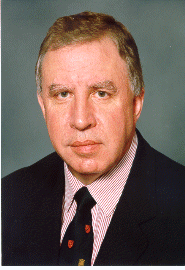Paul Murphy – 2003 Speech to Labour Party Conference
Below is the text of the speech made by the then Northern Ireland Secretary, Paul Murphy, at the 2013 Labour Party Conference in Bournemouth on 2nd October 2003.
Chair, Conference.
– the minimum wage and union recognition;
– the lowest unemployment in a generation and record investment in public services;
– defence of liberty abroad and economic stability at home.
Just some of the achievements of your Labour government.
However, I’d like today to point you to another achievement of which we can all be equally proud; the Good Friday Agreement.
Before the Agreement, politics in Northern Ireland had been in cold storage for 30 years.
In its absence, bigotry, hatred and sectarianism flourished, until Ulster became a by-word for terror and tragedy throughout the World.
Three and half thousand people killed, out of a population of one and a half million souls.
Almost every household touched in some fashion by a conflict that became banal, so familiar had it become.
And outside Northern Ireland, when the Troubles elbowed their way into the running order of a TV bulletin, or inspired some journalist to write, all too often the unspoken response was a sigh and a weary shrug of the shoulders at the insoluble problems of that part of the United Kingdom.
When I first arrived in NI as a minister, with Mo Mowlem, we were determined that Labour would never succumb to such defeatism.
We were determined that a resolution of the problems could be found and that politics – that democracy – could supplant terror in the future of Northern Ireland.
The Belfast Agreement marked the beginning of that process.
The Assembly, where nationalists and unionists, loyalists and republicans, worked side by side and delivered good government for Northern Ireland, marked a new era of politics and of peace.
It is, of course, an imperfect peace.
Though the ceasefires hold firm, and the deaths are counted in tens and not hundreds, stability and trust are still lacking.
The paramilitaries – whose day should have ended with the signing of the Good Friday Agreement – have not yet gone away.
Their continuing activities lay behind our reluctant decision to suspend the Assembly almost a year ago, and the cessation of those activities is the key to its restoration.
People in Northern Ireland know that Tony Blair, our Prime Minister, has invested unparalleled time and energy in the peace process.
They know, too, that he – and I – have said consistently that we want to see an election to the new Assembly in the coming weeks.
But an election serves a purpose: it must create a government.
And without action and words from the IRA, that can build trust and cement confidence, we risk either more direct rule or an election to a dysfunctional assembly and renewed cold storage for politics in Northern Ireland.
And direct rule cannot continue.
When we have an Assembly in Wales and a Parliament in Scotland, with local ministers and local accountability, it just isn’t right that Northern Ireland should be run by MPs from Torfaen, Merseyside, the Black Country and Essex.
While we are there, however, Jane Kennedy, John Spellar, Angela Smith, Ian Pearson and I will continue to try and provide good government for the people of Northern Ireland.
When those people – over 70% of them – voted for the Belfast Agreement, they signalled their determination to write a new chapter in their troubled history.
The foundations of that agreement are tolerance and compromise, justice and equality, rights and responsibilities.
The agreement leaves no room for hatred and violence, nor for bigotry and sectarianism.
And we are determined that the agreement will be implemented in its entirety and that it will realise the potential that people saw in it five years ago.
We are also determined that we will find other measures to bring about the changes in Northern Ireland society that the Agreement envisages.
That is why today I am announcing changes to the law in NI which will prosecute crimes motivated by sectarian hatred.
Intimidation and violence inspired by sectarian malice has no place in modern Northern Ireland.
The threats and terror visited upon the courageous men and women who are members of the Policing Partnerships in NI are just the latest examples of such vile behaviour.
The thugs who are responsible, and those behind recent death threats aimed at priests, or the cowards who placed pipe bombs in the yard of a catholic primary school, should know today that their actions will, when they are caught, result in prison sentences which properly reflect the sectarian motivation of their crimes.
The changes I am announcing will oblige judges in Northern Ireland to take into account the motivation of crimes by hatred of the victim’s religious faith, racial background or sexual orientation, and will empower them to hand out significantly heavier sentences where such motivation is proven.
I am also increasing the maximum sentences available to judges in such cases.
In so doing I am sending a message that I’m sure will be welcomed by the good people of Northern Ireland.
Sectarianism has no place in our society.
This government will not tolerate it, in Northern Ireland, or anywhere else in the UK.
Since my return to Northern Ireland, despite the difficulties which have ensnared the political talks, I’ve witnessed tremendous improvements in life there.
The transformation of the police is one of the greatest.
The PSNI is now a modern force which enjoys support across religious and political divides and which polices the whole community with fairness and justice.
But there are other changes too…
The economy is growing – faster in many sectors than anywhere in the UK.
People are in work, unemployment at 5%.
Tourism is booming, and figures out just last week show that Belfast is now the 4th most visited city in the country
This is a part of the World which is changing – and at a rate with which we politicians sometimes struggle to keep pace.
But we must now redouble our efforts.
People in Northern Ireland want devolution back.
They want decisions about their schools and hospitals to be taken locally.
And they want their Ministers in government in a locally elected and locally accountable Stormont Assembly.
In conclusion, I’d like to pay tribute to the Party Leaders in Northern Ireland who, for years, have striven to make this peace process work – to David Trimble, Mark Durkan, Gerry Adams, David Ervine, Monica McWilliams, and David Ford.
I applaud too Bertie Ahern and the Irish Government for all their work.
We cannot return to the troubled past.
We must make progress…
And all my instincts tell me that we will.


